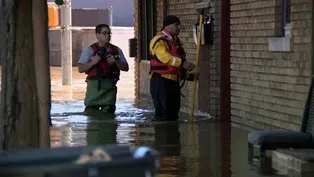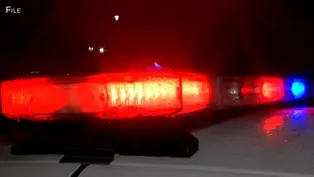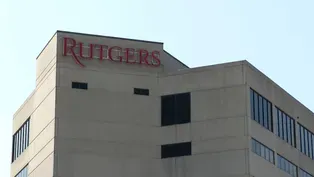NJ Spotlight News
Chat Box segregated: Panel
Clip: 7/10/2023 | 9m 45sVideo has Closed Captions
On Chat Box, a panel discusses the schools desegregation case.
On Chat Box, David Cruz discusses the status of the long-running New Jersey schools desegregation case with Latino Action Network President Emeritus Christian Estevez and Rutgers Professor Charles Payne, co-author of a report on the impact of segregation in Jersey schools.
Problems with Closed Captions? Closed Captioning Feedback
Problems with Closed Captions? Closed Captioning Feedback
NJ Spotlight News is a local public television program presented by THIRTEEN PBS
NJ Spotlight News
Chat Box segregated: Panel
Clip: 7/10/2023 | 9m 45sVideo has Closed Captions
On Chat Box, David Cruz discusses the status of the long-running New Jersey schools desegregation case with Latino Action Network President Emeritus Christian Estevez and Rutgers Professor Charles Payne, co-author of a report on the impact of segregation in Jersey schools.
Problems with Closed Captions? Closed Captioning Feedback
How to Watch NJ Spotlight News
NJ Spotlight News is available to stream on pbs.org and the free PBS App, available on iPhone, Apple TV, Android TV, Android smartphones, Amazon Fire TV, Amazon Fire Tablet, Roku, Samsung Smart TV, and Vizio.
Providing Support for PBS.org
Learn Moreabout PBS online sponsorshipLet's dive into the New Jersey schools segregation suit.
It's a case that was originally brought in 2018 and has moved slowly through the courts.
There is hope that some kind of decision is in the offing.
One of the original plaintiffs in the case is with us.
He is president emeritus of the Latino Action Network.
We welcome Christian Estevez to Chat Box.
Christian welcome.
Thank you, David.
And Charles Payne is the director of the Cornwall Center for Metropolitan Research at Rutgers-Newark.
He is the co-author of the study Segregated Schooling in New Jersey.
Professor, welcome to Chat Box.
Thank you very much for having me.
So, Christian, let me start with you.
This case, as I say, goes back to 2018.
Can you quickly tell us what is the origin?
Why did why was this case filed?
This case was filed because we have been noticing for a very long time the disparate treatment that poor students of color had been receiving and that the previous remedies were really not addressing it.
And when we looked at the core underlying factors that were leading to the disparities, we saw that it really had a lot to do with segregation in schools.
And the 2017 UCLA report that confirmed our concerns And it showed that New Jersey was one of the most segregated states in the nation.
And we felt that we had to address it.
Brown versus Board of Education that had been decided in 1954 was supposed to do away with this.
But in New Jersey towns found a way around Brown versus Board.
And so we filed this lawsuit on the anniversary of Brown versus Board of Education in May of 2018 in order to to to to apply the New Jersey Constitution to fix that.
That workaround that people had been doing in order to violate Brown.
So so what's the question before the court.
Right now the court isn't you're not asking the court to make this decision right now.
Is this a procedural question what's happening right now before the judge.
What we want.
You know, we think that the data speaks for itself.
Anybody who goes into any of the any of the cities where we're in this predominantly poor Black and Latino students can see that there's stark segregation.
All the other districts are majority white.
The vast majority of Black and Latino students go to schools that are majority minority.
And, you know, we're asking the court to to look at this data, which speaks for itself and find the state liable for violating its own constitution.
Professor, your study coauthored by Vandina Campbell, we should mention, found what about the disparities and the outcomes for kids trying to learn under current conditions in New Jersey schools?
I think it just confirms what my colleague just said, that virtually every aspect of education that we could find data on children going to segregated school environments in the state of New Jersey have it worse than children going to non segregated.
Right.
So if you talk about the power of discipline, especially exclusionary, discipline, if you talk about how often teachers come to school, if you talk about children having access to high quality schools, having access to rigorous courses, having access to STEM courses, in all of those respects, segregated educational environments, New Jersey are greatly inferior.
Sometimes the numbers are just dramatically different, greatly inferior to non-segregated.
And this this UCLA report that Christian referenced found what that that Black kids were going to schools where they were mostly Black kids, predominantly Black kids, Latino kids as well.
And white kids were going to schools where it was mostly white kids.
Is that right?
Yes, that was the broad finding.
But again, the point that Mr. Estevez made earlier about finding that New Jersey was the sixth most segregated state I think I'm saying that correctly.
That was the summary points on that report.
So the racial ethnic disparities in schools really follow patterns of housing and economic inequities.
The state argues that those are conditions that are beyond the scope of this suit.
Would you agree or disagree with that, Christian?
I disagree with that.
I think that, you know, the state has an obligation under this Constitution to address segregation in any form and however it comes about.
And the reality is that after it when when when Brown versus Board of Education started to be applied in the late sixties, after several lawsuits in Florida, including the Booker versus the City of Plainfield Board of Ed, you know, what happened is people started to flee the urban areas.
White people started to move into the suburbs and then use redlining and other racial racially motivated techniques to keep people of color from moving in behind them.
So what you ended up with was these these pockets of concentrated poverty, which created generations of of inequity and and and disparities.
Professor, most recently, the state argued that the entire education system in New Jersey would have to be razed to the ground and rebuilt brick by brick, figuratively and most literally, most likely literally as well.
As you look to what kind of fixes might follow, a victory in this case is the state right about that?
How how big a job would it be to fix this problem?
I don't think we should engage with that kind of rhetoric.
I mean, it is on its face.
So it's intended to make it seem like it's a problem that can't be solved.
I do want to go back to one point that my colleague made and just underscore it.
Under the constitution of the state of New Jersey, my understanding is that this is the only state where this is true.
Educational segregation is illegal.
It does not say it is illegal if it's caused by this factor or that factor.
The Constitution says, educational segregation is illegal in this state.
That's where we should begin these conversations.
If we want to talk, we've been talking about remedies no of course you do not have to tear down everything to to move to a better place.
Or one of the things that should be possible in a state where money still talks is that the state can create financial incentives for districts that reduce segregation, either within the district or across districts.
That's and that's entirely possible for the state.
And also, we get all the key resources to those schools which are going to remain segregated for the time.
Christian, what kind of remedies do you think are possible both in the short term and the long term?
Listen, you know, a lot of the remedies are or the things that are needed are already available to the state.
You know, the state already has several regional school districts.
My kids go to regional schools in Scotch Plains, Fanwood, where they combine all the kids in both towns and so towns all the time get together in order to to to to share resources to educate kids from multiple towns.
We can do this in a way that is inclusive of of kids from all economic backgrounds, all socio-economic backgrounds.
And it's not just good for the Black and Latino kids.
It's good for the white kids to to grow up around really the diversity they're going to face when they go out into the workforce.
So they can they can grow up learning next to kids from different backgrounds and they can see that they're human just like them and that they are there just as talented people of all different backgrounds.
And that will make for a better New Jersey in a better America.
Professor, I know you say you don't want to engage with the kind of rhetoric that we heard from the state about how difficult this is going to be, but how long do you think it will take to implement the kind of changes that would be necessary to fix this problem?
Well, again, when you say how long it's going to take, I don't think there's any basis for answering that.
Something like regionalization, which I think is an excellent way to think about the problem that would clearly take years, given how invested New Jersey school districts tend to be in their local autonomy.
So we have to have some clarity about how much political will there is.
And that, I suppose, is a part of what we will find when the Supreme Court renders its decision.
Christian, is there political will out there?
You know, I think that, you know, just kind of go back to the previous question about how long it's going to take.
You know, the question we ask is how many more generations of kids are going to be behind because we don't want to take this problem up into and start to deal with it.
I think that we need to start moving on with the reason we're in court because we don't think there's political will.
We don't think the legislature will do it on its own.
And we need the courts to step in and make bold decision here.
Important change has to be forced upon those who are reluctant.
That's right.
All right.
Christian Estevez, Charles Payne, thank you for joining us today.
Thank you, David.
Video has Closed Captions
Clip: 7/10/2023 | 1m 27s | NJ Gov. Phil Murphy talks about the schools desegregation lawsuit. (1m 27s)
Deadly cargo ship fire in Port Newark is now contained
Video has Closed Captions
Clip: 7/10/2023 | 1m 57s | Two Newark firefighters were killed in the initial response to fire (1m 57s)
Flood insurance program needs reform, say NJ lawmakers
Video has Closed Captions
Clip: 7/10/2023 | 4m 12s | Menendez, Pallone introduce legislation to protect homeowners, small business owners (4m 12s)
Florida murder suspect shot and killed in Jersey City
Video has Closed Captions
Clip: 7/10/2023 | 1m | The NJ attorney general's office is investigating the death (1m)
Murphy signs prescription drug reforms
Video has Closed Captions
Clip: 7/10/2023 | 4m 14s | Caps on out-of-pocket costs for insulin, EpiPens and asthma inhalers among other measures (4m 14s)
Record-setting global temperatures give glimpse of future
Video has Closed Captions
Clip: 7/10/2023 | 5m 12s | Interview: New Jersey State Climatologist David Robinson (5m 12s)
Rutgers hikes tuition and fees, OKs medical school merger
Video has Closed Captions
Clip: 7/10/2023 | 4m 50s | Additional $387 per semester in tuition and fees (4m 50s)
Providing Support for PBS.org
Learn Moreabout PBS online sponsorshipSupport for PBS provided by:
NJ Spotlight News is a local public television program presented by THIRTEEN PBS

















